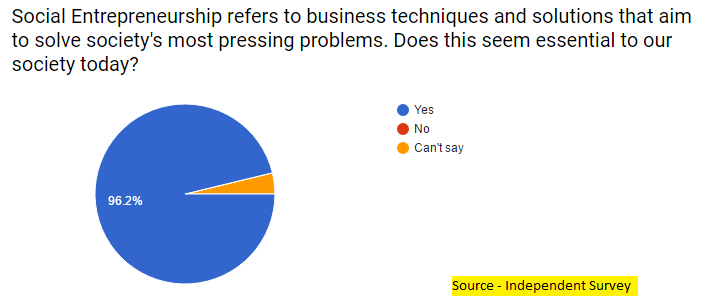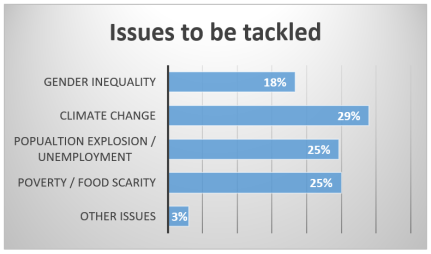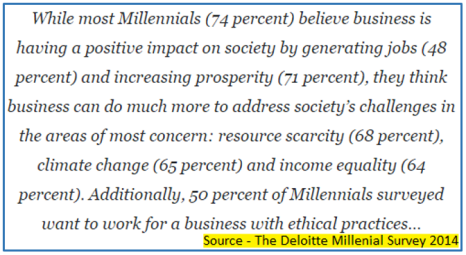I got into SIBM, Pune!
More about that enthralling experience in a later post..
As part of the Pre-Induction course given to us, we had to write our own dissertations! Being a student of Innovation and Entrepreneurship, my topic was Social Entrepreneurship – An Overrated Phenomenon.
At the risk of sounding boastful, I’m going to proudly mention that I was one of the two winners of the dissertation for this topic 😀

So here goes, my first dissertation ever!
SOCIAL ENTREPRENEURSHIP – AN OVERRATED PHENOMENON
An innovation
Recently, there was news of an eco-cooler developed in Bangladesh. The device is simple. All it requires is a grid to be made out of plastic bottles and installed in place of windows. The hot air, which enters the open end of the bottle, gets compressed at its neck and becomes cooler, lowering the room temperature by about 5 degrees. This is a simple device that doesn’t even require electricity! Just a good understanding of basic laws of physics.
Each eco cooler that is installed gives us three basic benefits. An affordable cooling solution for those who cannot afford electricity run coolers; lesser dependence on CFCs, i.e. no contribution to global warming; and a lesser load on electric supply.
This eco cooler is a simple, yet innovative example of social entrepreneurship.
What is Social Entrepreneurship?
Social Entrepreneurship refers to business techniques and solutions that aim to solve pressing issues in the society. Unlike most businesses where the mark of success is profits, social enterprises measure their success by the positive change they bring in our physical and non-physical environment. They bring about these changes through innovative solutions, and profits are simply added bonuses or rewards. Social entrepreneurs worldwide are taking issues into their own hands rather than leaving them to the local governments and civic bodies to tackle.
The Ashoka Fellowship is an organisation that recognises social entrepreneurs.
The essence of social entrepreneurship is not in solving multiple social issues at once. Neither is it to increase the number of beneficiaries.
The essence of social entrepreneurship is in tackling a definite number of social issues, with a fixed number of beneficiaries. This helps the enterprise focus on a certain group and align their business operations accordingly.
What sets apart social entrepreneurs is their vision and the commitment to it. They have a drive to solve social issues, which enables them to be passionate about their cause, think creatively, and think fast.
The need
Civic bodies and governments do their best through various campaigns and programs to elevate social and living conditions of its citizens. But, the beneficiaries are far too many and far too widespread. This makes it difficult for the effects of these programs to reach all targeted beneficiaries. Sometimes, the benefits do not trickle down to people lower in the social hierarchy.
This is where the essence of social entrepreneurship comes in – a fixed number of issues to tackle for a fixed number of beneficiaries. Many authors and economists have propounded upon the importance of this.
Is Social Entrepreneurship an overrated phenomenon?
The answer is No, it is not. We will now discuss why.
The survey & inferences
I conducted a survey recently to gauge the understanding and opinions of the general population on social entrepreneurship. It amassed quite a few responses, and over 96% of the respondents believed that it is a phenomenon very much needed in the world today.
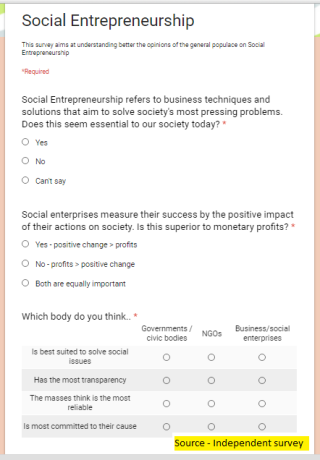
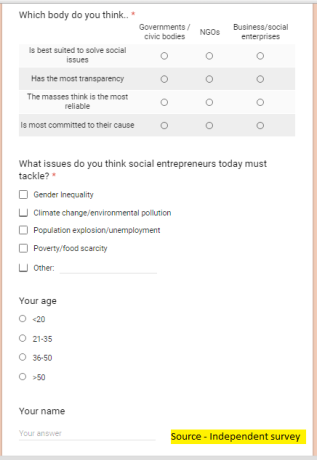
Out of three types of entities mentioned in the survey – governments, NGOs and business/social enterprises – respondents believed that enterprises were most likely to solve social issues and were the most transparent. This shows a high degree of confidence of the general population in social enterprises.
However, respondents believed that masses were likely to find NGOs more reliable and committed to the cause than enterprises. This may be because the common man believes that when it comes to an enterprise, profit, rather than an intention to bring change, is the driving factor. They also connect with NGOs better since they work at the grassroots level. Hence, it is essential that social entrepreneurs today operate their business activities in a way that builds confidence among the masses.
The speed bumps and roadblocks
But, realizing social change is not easy. There are multiple factors that hamper the process-
-
Acknowledging the problem – The community has to accept that there is an issue that needs to be resolved. If this is not done, the benefits/solutions will neither be accepted, nor will they realise their full potential.
-
Receptiveness of the community – For change to be made, the community has to accept not only the change, but also the methods employed to realise that change. They have to be open to new ideas and solutions.
-
Inconsistency in measuring change – Social change is intangible and extremely subjective. This makes it difficult for entities to measure it.
One of the questions asked in the survey was what issues did respondents think social enterprises today must target.
A majority of respondents believe that climate change is the most pressing issue that needs to be tackled first and foremost.
An example
Social entrepreneurs have targeted a number of issues, small as well as monumental ones. The solutions to these are, more often than not, simple and cost effective.
An excellent example of an Indian social enterprise is Frontier Markets – a rural marketing, service distribution and sales company. They work towards providing rural households access to social impact products at affordable prices.
Frontier Markets was founded by Ms. Ajaita Shah in 2009 and it started operations in rural India. They are working with clean energy products like solar lighting and smokeless stoves.
The Conclusion
The world we live in today is progressing fast, but is also leaving behind certain sections of the society. Each of us must contribute towards bettering the lives of our fellow citizens.
Social enterprises are important to the economy because they work towards skilling people & creating jobs; bringing new goods and services to the market; and helping create & deliver social impact products.
Following factors contribute to the growing need for social enterprises today-
-
Innovative products & solutions
-
A pressing, global need to solve social issues
-
Success stories of social enterprises world over.
A number of organisations, publications and awards recognise social enterprises globally, like the Ashoka Fellowship, Forbes Magazine and the Social Enterprise Awards Australia respectively. Such organisations give impetus to rising social entrepreneurs.
Based on the discussion above, we can reasonably conclude that Social Entrepreneurship is not an overrated concept.
So, did you like it? Did you like it? I’m all ears to comments and feedback!

I cannot end a post without a gif, can I? ![]()

